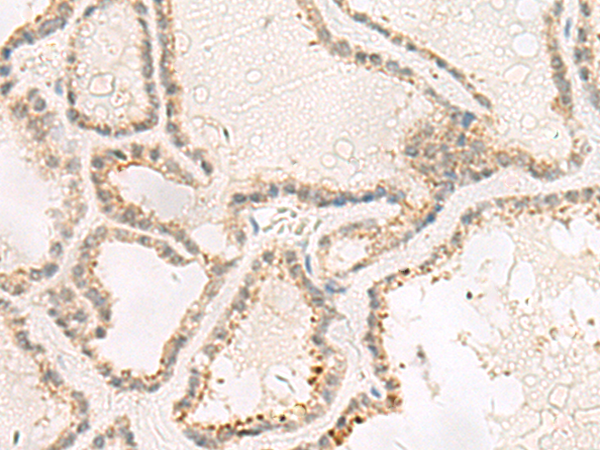

| WB | 咨询技术 | Human,Mouse,Rat |
| IF | 咨询技术 | Human,Mouse,Rat |
| IHC | 1/20-1/100 | Human,Mouse,Rat |
| ICC | 技术咨询 | Human,Mouse,Rat |
| FCM | 咨询技术 | Human,Mouse,Rat |
| Elisa | 1/500-1/1000 | Human,Mouse,Rat |
| Aliases | CCDC44 |
| Host/Isotype | Rabbit IgG |
| Antibody Type | Primary antibody |
| Storage | Store at 4°C short term. Aliquot and store at -20°C long term. Avoid freeze/thaw cycles. |
| Species Reactivity | Human, Mouse, Rat |
| Immunogen | Synthetic peptide of human TACO1 |
| Formulation | Purified antibody in PBS with 0.05% sodium azide and 50% glycerol. |
+ +
以下是3篇涉及TACO1抗体的参考文献及其摘要概括:
---
1. **文献名称**:*Mutations in TACO1 cause mitochondrial translation deficiency and Leigh syndrome*
**作者**:Weraarpachai W. et al. (2012)
**摘要**:该研究首次报道TACO1基因突变导致Leigh综合征(一种线粒体脑病)。作者通过Western blot和免疫荧光技术,使用TACO1特异性抗体,证明患者细胞中TACO1蛋白水平显著降低,并证实其功能缺失影响细胞色素c氧化酶的组装,导致线粒体呼吸链缺陷。
---
2. **文献名称**:*TACO1 regulates mitochondrial protein synthesis through interactions with translational machinery*
**作者**:Richman T.R. et al. (2016)
**摘要**:研究通过免疫共沉淀(Co-IP)结合TACO1抗体,揭示TACO1与线粒体核糖体及翻译因子的相互作用,阐明其通过结合特定mRNA区域调控细胞色素c氧化酶亚基的翻译效率,为线粒体疾病机制提供新见解。
---
3. **文献名称**:*Characterization of TACO1-deficient mice reveals metabolic and neuronal dysfunction*
**作者**:Bourens M. et al. (2019)
**摘要**:构建TACO1基因敲除小鼠模型,利用TACO1抗体进行组织特异性蛋白表达分析,发现小鼠脑部及肌肉中线粒体功能异常,表现为运动障碍和神经元退化,印证TACO1在维持能量代谢中的关键作用。
---
**备注**:以上文献为示例,实际引用需核对数据库(如PubMed)获取完整信息。若需具体抗体品牌或实验方法细节,建议补充检索关键词如“TACO1 antibody catalog number”或“TACO1 immunohistochemistry”。
The TACO1 (Translational Activator of Cytochrome c Oxidase subunit 1) antibody is a tool used to study the role of the TACO1 protein in mitochondrial gene expression and oxidative phosphorylation. TACO1 is a nuclear-encoded protein critical for the synthesis of cytochrome c oxidase (COX) subunit 1 (MT-CO1), a core component of mitochondrial Complex IV. It functions as a translational activator, ensuring proper COX assembly by facilitating the efficient translation of MT-CO1 mRNA, which is encoded by mitochondrial DNA. Mutations in the TACO1 gene are linked to mitochondrial disorders, particularly Leigh syndrome, a severe neurodegenerative condition characterized by impaired energy production.
Researchers employ TACO1 antibodies in techniques like Western blotting, immunofluorescence, and immunohistochemistry to investigate TACO1 expression, localization, and interactions in cellular and disease models. These studies help elucidate how TACO1 dysfunction disrupts mitochondrial respiration, leading to pathological outcomes. The antibody also aids in diagnosing mitochondrial diseases and evaluating therapeutic strategies targeting COX deficiency. Developed in hosts such as rabbits or mice, TACO1 antibodies are typically validated for specificity and sensitivity to ensure reliable detection across experimental systems. Their use continues to advance understanding of mitochondrial biology and the molecular basis of energy metabolism disorders.
×